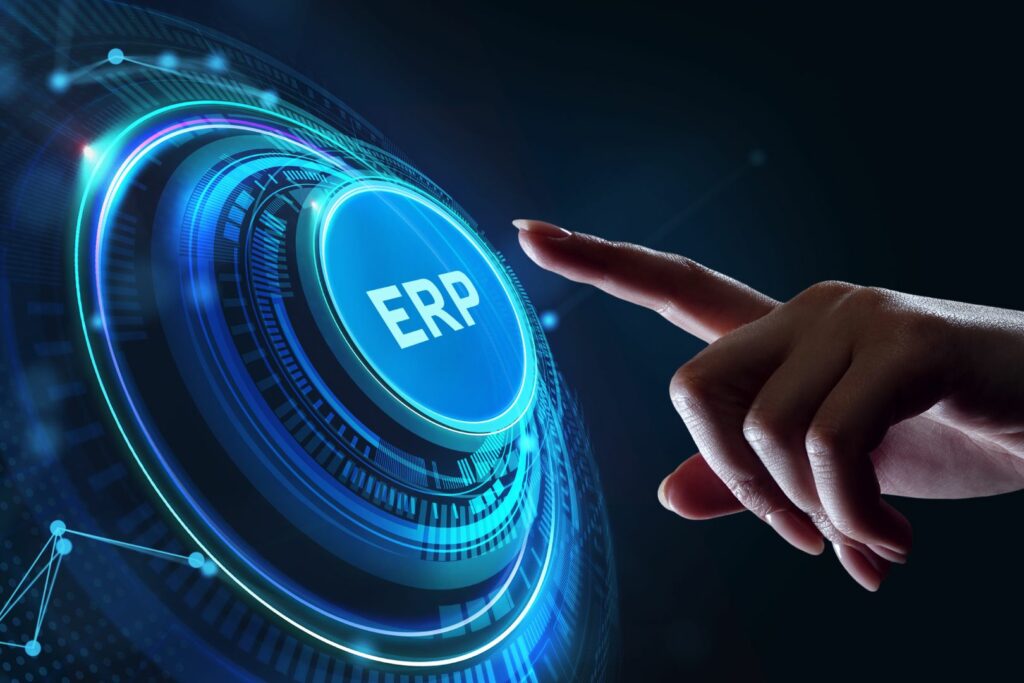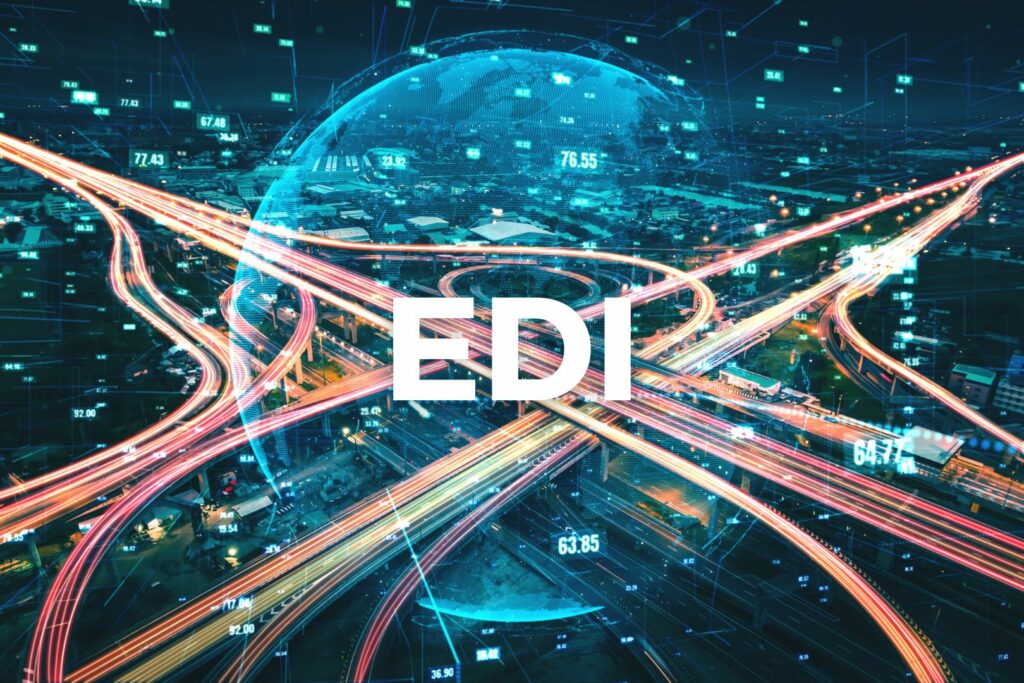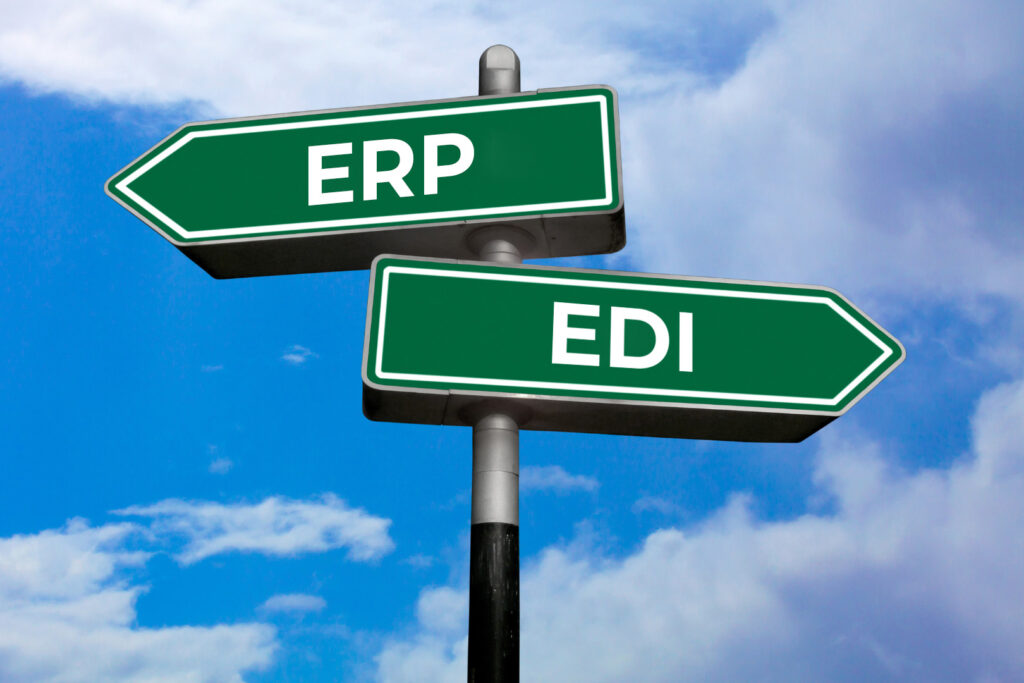In today’s rapidly evolving business landscape, streamlining operations, improving efficiency, and enhancing collaboration is paramount for sustained growth. Two technologies that play a pivotal role in achieving these goals are ERP (Enterprise Resource Planning) integrations and EDI (Electronic Data Interchange) extensions. While both solutions aim to optimize business processes, they possess distinct features and offer unique advantages. In this blog, we’ll delve into the world of ERP integrations and EDI extensions, exploring their benefits, differences, and how they can revolutionize your organization.
Table of Contents

What is an ERP Integration?
ERP integrations refer to the seamless connection between an ecommerce platform and an ERP system. It allows businesses to synchronize and exchange critical data, such as orders, inventory levels, customer information, and pricing structures.
ERP integrations streamline various business processes, including order management, inventory control, financial operations, and customer relationship management. By centralizing data and automating workflows, businesses can enhance efficiency, reduce errors, and improve decision-making.
ERP integrations enable real-time data synchronization between the ecommerce platform and the ERP system. This ensures accurate and up-to-date information across all channels, preventing data inconsistencies and enhancing customer experience.
What is an EDI Extension?
EDI extensions enable businesses to communicate and exchange standardized electronic documents, such as purchase orders, invoices, and shipping notices, with their trading partners. EDI eliminates manual paper-based processes, replacing them with automated electronic transactions.
EDI extensions facilitate seamless collaboration within the supply chain by automating document exchange. It reduces manual effort, minimizes errors, and accelerates order fulfillment, leading to improved operational efficiency and stronger partner relationships.
EDI adheres to industry-specific standards and protocols, ensuring data integrity and security during transmission. It helps businesses comply with regulatory requirements and fosters trust among trading partners.

How can you differentiate ERP Integrations and EDI Extensions?
| ERP Integrations | EDI Extensions | |
|---|---|---|
| Full Form | Enterprise Resource Planning | Electronic data Interchange |
| Definition | Seamless connection between an ecommerce platform and an ERP system | Automated exchange of standardized electronic documents with trading partners |
| Scope | Synchronization of comprehensive business data (orders, inventory, pricing, customer information) | Document-based data exchange (purchase orders, invoices, etc.) |
| Workflow Automation | End-to-end automation of business processes (order management, inventory control, financials, etc.) | Connects businesses with external trading partners |
| Real-Time Data Sync | Enables real-time data synchronization between the ecommerce platform and ERP | Facilitates real-time document exchange with trading partners |
| Streamlining Operations | Optimizes order management, Inventory control, financial operations and more | Improves operational efficiency and collaboration within the supply chain |
| Compliance and Security | Ensures data integrity and security during transmission | Adheres to industry- specific standards and protocols for secure data exchange |
| Scalability and Growth | Enables businesses to scale and adapt to changing demands | Facilitates business expansion and growth in trading partner networks |
| Synergy | Can be combined with EDI extensions for end-to-end automation and enhanced visibility | Complementary solutions that optimize both internal processes and external collaborations. |
In today’s business landscape, ERP integrations and EDI extensions have become essential for optimizing operations, streamlining processes, and fostering collaboration. While ERP integrations synchronize comprehensive business data and automate internal workflows, EDI extensions enable standardized electronic document exchange with trading partners. By leveraging these technologies, businesses can enhance efficiency, reduce errors, ensure compliance, and pave the way
Cloudfy offers both ERP as well as EDI Integration Extensions
Cloudfy offers a powerful solution for integrating and enhancing both ERP (Enterprise Resource Planning) and EDI (Electronic Data Interchange) processes. By leveraging Cloudfy’s cloud-based platform, businesses can streamline their operations, improve data accuracy, and enhance overall efficiency. Cloudfy’s seamless integration capabilities allow for real-time synchronization between ERP systems and EDI transactions, ensuring accurate and up-to-date information exchange with trading partners. With Cloudfy, organizations can automate key processes, reduce manual data entry errors, and optimize supply chain management, ultimately enabling them to deliver faster, more accurate, and customer-centric services. Schedule a Demo to know more!
Frequently Asked Questions
Absolutely! ERP integrations and EDI extensions can be combined to achieve end-to-end automation and enhanced visibility across internal processes and external collaborations.
Yes, both technologies are beneficial for businesses of all sizes. They can help small businesses optimize operations, improve efficiency, and foster growth.
ERP integrations and EDI extensions adhere to industry-specific standards and protocols to ensure data integrity and security during transmission, fostering trust among trading partners.
Yes, both technologies are scalable and can adapt to changing demands. They enable businesses to grow, expand their trading partner networks, and remain agile in a dynamic market.

How to choose the best B2B ecommerce platform for your medical device business
Streamline B2B sales with Cloudfy’s Ecommerce platform for medical devices. Simplify ordering, ensure compliance, and boost efficiency in healthcare supply. … Read More

Cloudfy Wins Best Exploitation of Technology Award at Direct Commerce Awards
We’re thrilled to announce that Cloudfy has won the award for Best Exploitation of Technology (Annual Sales Over £25M B2B) at the Direct Commerce Awards last week! Our Cloudfy B2B platform, along with the Sales Representative Person App and Customer … Read More

Easy Ordering and Improved Customer Satisfaction for FMCG Manufacturers and Distributors with B2B Ecommerce
Telephone enquiries, paper order forms, rapid turnarounds and tight margins characterize the fast-moving consumer goods (FMCG) sector. However, with expected global growth above 4.5% to 2032 and cost pressures increasing, FMCG manufacturers and distributors need new approaches. Many retailers have … Read More






